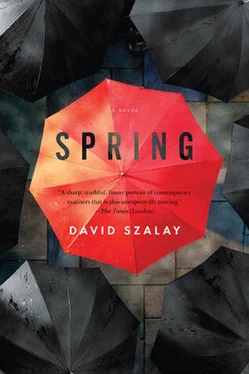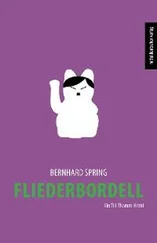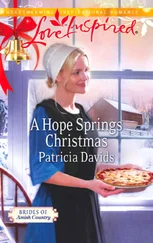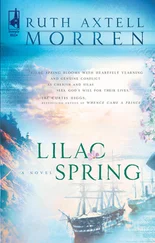Piqued vanity. He walks out into the early morning light. The London light, flat and plain on London streets.
Vanity of vanities, all is vanity
* * *
She has just never been very moved by his love, that was the thing. It left her unmoved. On her way home on Monday night, she had thought of that weekend in February when they went to see his horse.
They left London late on Saturday morning and were at the stables by two. James seemed disappointed that the trainer himself wasn’t there. They were met instead by a tall, lean, middle-aged, innocent-looking man—James introduced him as Piers—who emerged from a Portakabin and hailed them as they stood there under the snowladen sky. The stables were very miserable that Saturday afternoon. Some sort of liquid trickled along a spillway. The smells were intense—the smells of horse-piss, of manure, of mouldy straw. The doors of the stalls were all shut; from some of them came a quiet whickering as they passed. They stopped at one of them and finally taking his hands out of his pockets—he was wearing a husky and fingerless gloves—Piers drew back the bolts. He had a tangle of old tack under his arm. He went in with it and emerged a minute later (the visitors stood shivering outside) with the horse on a halter. She had what looked like a filthy old duvet over her.
‘See, she’s looking super,’ he said.
James patted the solid flank of the horse’s neck and, smiling proudly, encouraged her to do the same.
‘How old is she?’ she asked.
‘Five…?’ James said. ‘She’s five isn’t she?’
Piers just nodded, smoking.
‘Five. Isn’t she lovely?’
Lovely? Yes, okay. ‘M-hm,’ she said. She found it touching, his pride in this horse—and she seemed like a perfectly nice horse, if slightly odd looking. Thickly mottled, with a whiskery lower lip, the liquid hemisphere of her eye fixed on an ice-filmed puddle. The way she stood there so patiently, only her ears moving, made Katherine think of the horses in Tarkovsky’s Andrei Rublev —those mute, unjudging witnesses of the human scene. Quietists. The perfection of some kind of monastic ideal. Leaving James to stroke the mare’s nose, she looked into the stall. It was a musty, humid hole. She shuddered at the thought of spending a night in there.
The first isolated snowflakes were touching down in the mud and in the horse’s tough mane. James was feeding her an apple. He had had it in his pocket all the way from King’s Cross. He seemed delighted with the way her teeth and lips went at the fruit. They sheared off a whole half of it, sluicing juice everywhere. Then she lowered her huge head to pluck the second half from the unspeakable mud at their feet.
‘Okay?’ Piers said.
They turned down his offer of tea and went for a drink in the pub in the village. The Plough. Seven stars on the sign. The village was not much of a place, especially on a day like that. The pub was nice enough though. There was a fire, and they sat at the inglenook table.
Suddenly it was night-time, and the pub was quite full. James saw someone he seemed to know—a very slight man with skin of translucent whiteness, legs like tongs and some front teeth missing. He went over to speak to him. ‘Jockey,’ he explained. ‘Tom.’
‘Tom?’
‘Piers’s son.’
‘Oh.’
He said impulsively, ‘Why don’t we spend the night somewhere near here?’
For a few seconds she said nothing. She was not sure whether she wanted to do that. With a faint smile, she examined his face, her eyes seeming to move from feature to feature. ‘Like where?’ she said.
An old-fashioned hotel in Cambridge.
And it was in that hotel, lying on a squidgy mattress, with a scalpel of moonlight dissecting the drapes, that he said, ‘I think I’m in love with you.’
And what did she say? First she sighed. She sighed as if she wished he hadn’t said it. Then, when several frozen seconds had elapsed, she said, ‘I can’t say the same, James. I can’t say the same.’ There was a long silence. She knew she had hurt him. It frightened her that he should say he was in love with her—or that he thought he was. It made her wonder worriedly what she was doing there, in that fusty hotel in Cambridge—which was probably why she then whispered, her voice making a plume of vapour in the moonlight…
He just doesn’t understand her, she thought, standing on the mountainous up-escalator at Angel station, her face tiredly empty of expression. He doesn’t understand her. No more than she understands him. She thought of those words of Saint Paul’s, the ones you hear at weddings. They were heard at her own wedding. Then will I know truly, even as I am truly known … She thinks of those words, which unfailingly put a film of emotion on her eyes, as expressing a kind of ideal love. The idea of knowing, of being known. There is just no sense of that here. He does not know her. He does not understand her. He has no instinct for her. That was obvious, she pointed out to herself as she stepped off the escalator, from the start. On one of the first nights they spent together, she found herself lying there lightlessly. ‘Are you awake?’ she said. She had to say it several times, sitting over him. Finally he moved. ‘Are you awake?’ He mumbled something. He sounded as if he was under massive sedation. She sighed and made a sharp movement under the duvet. ‘I don’t feel we’re together,’ she said. ‘I feel very separate from you.’ And then, a few moments later, ‘I feel lonely. Did you hear me?’
He said, ‘I…’
There was a long silence.
‘Please hug me,’ she said.
With what seemed to be a huge effort, he turned over and took her heavy warmth in his arms. He kissed her somewhere on her head. ‘Don’t feel lonely,’ he murmured. He squeezed her. ‘You shouldn’t feel lonely…’
‘We’re just not together,’ she said then, sitting up. ‘I don’t feel I’m really with you. And you don’t know how to make me feel okay.’
He did not seem to know what she was talking about. He said, ‘What do you mean?’ She threw her head onto the pillow. ‘What do you mean?’ he said, sounding more awake. She was staring into the darkness. ‘What do you mean we’re not together? I don’t know what you mean when you say that…’
‘That’s the problem! You don’t understand. ’
Sometimes—usually when the sleepy sensation of skin touching skin seems of itself to hold some sort of mute insufficient promise—she still hopes that he might somehow start to understand her. The trouble is, she is unable to help feeling that it just doesn’t work like that—that if he does not understand her instinctively then trying is pointless, even if it were possible. It just makes the whole situation seem so arbitrary—and if it seems arbitrary how is she to have faith in it? Why him, in other words? Why not someone else?
For instance, she had found herself looking at Jonathan tonight and wondering, his status as an ex notwithstanding, whether he might not suit her more than James. She enjoys him. She enjoys his wit, his warmth, his sophisticated friends. He was, and evidently still is, successful. Tonight was the launch party of some novel he is publishing and he treated her like a VIP, spent too much time talking to her, introduced her to some famous people… They were together for several years when she worked in publishing. It might easily have led to marriage, to white-stuccoed nook. She ended it—suddenly, shattering his heart—when she found that she was not sure that she was in love with him. She still sees the shy hope in his eyes, and when she saw it tonight she wondered whether she had been wrong to decline in him the sort of sociable life among the upper London intelligentsia that she had always imagined for herself. It was then, when she ended it with him, that she left publishing to pursue her idea of a small hotel somewhere near the sea. Would that make her happy? That was what it was supposed to do. Letting herself into the flat, she thought of a story Jonathan had told her once. Madame De Gaulle is being interviewed by the BBC shortly after her husband’s death. She is asked what she is looking forward to now, and says what sounds in her French accent unmistakably like, ‘A penis.’
Читать дальше












